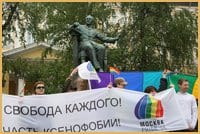Faced with Mayor Yuri Luzhkov’s ban on gay Pride activities for the third year in a row, about 35 Moscow activists misled police into going to the wrong location and then successfully staged two surprise actions May 31.
As city police and riot police blockaded City Hall, activists pulled off a demonstration nearby at the Tchaikovsky statue outside the Moscow Conservatory.
They unfurled a banner and flags, spoke with trusted journalists who had accompanied them to the location, and chanted, “Tchaikovsky was also gay,” “No to homophobes” and “Equal rights for LGBT.”
The 12:45 pm action lasted about 15 minutes, after which the group staged a brief march down the street, then dispersed before police could arrive.
At 1:15 pm, a second action began across the street from City Hall, where activists blockaded themselves inside a third-floor apartment and draped a large banner above the street that read, “Rights for gays and lesbians – homophobia of Moscow mayor should be prosecuted.” They also released 250 balloons from the apartment’s windows.
Anti-gay protesters threw garbage and eggs at the apartment balcony. At least 36 of the protestors were arrested, police told Interfax.
At about 1:45 pm, police began threatening to break down the door to the apartment.
Nearly eight hours later, they forced the door open and arrested four people inside, charging them with taking part in an unsanctioned demonstration and disobeying a police order.
“Breaking the door was an illegal action as the police did not carry an order signed by the court,” said head Pride organizer Nikolai Alekseev. “This was a violation of private property.”
The four activists were held overnight, taken to court, then released. If found guilty, they will likely be fined.
“We wanted to make this Pride different from the last two years,” Alekseev told the Moscow Times. “We didn’t want to have any more beatings in the street.”
Moscow’s first Pride in 2006 ended in violence, injuries and mass arrests as anti-gay protestors and riot police drove queers from the Kremlin.
The first of two main confrontations occurred when gay activists approached the Tomb of the Unknown Soldier, intending to lay wreaths.
They were halted by riot police, neo-fascists and hymn-singing Christian militants.
“We were immediately set upon by about 100 fascist thugs and religious fanatics who began pushing, punching and kicking us,” British gay leader Peter Tatchell said at the time. “Some individual protesters were surrounded, abused and attacked by gangs of fascists.”
The counter-protesters, some wearing masks, also tossed flares. Riot police eventually separated the two groups and arrested some members of both groups.
A second large-scale confrontation then occurred across from city hall.
“Soon after reassembling, another line of riot police came and drove us out of the square, straight into an oncoming posse of fascists,” Tatchell said.
In all, at least 120 people were arrested, including Alekseev and Pride co-organizer Eugenia Debryanskaya. Most were later released, but police said they would “draw up administrative protocols” against the march’s organizers.
Police said the gay marchers and their supporters numbered around 200. About 1,000 police officers – a quarter of Moscow’s force – were assigned to prevent the march from happening.
Moscow police stopped last year’s Pride rally outside City Hall before it could start and arrested most of the organizers as they arrived, while anti-gay thugs beat up Russian and foreign gays and lesbians who had gathered for the event.
Police officers, including hundreds of state riot police, did little to halt the bloody assault and, in some cases, chatted casually with the anti-gay attackers and spewed homophobic insults at gay activists.
Mayor Luzhkov had already issued his ban on any Pride parades or other public Pride events. He called Pride parades “satanic.”
This year, Moscow’s gay activists were determined to march unhindered – despite the mayor’s ban, the expected police opposition and the threat of violent protestors.
“Today we showed that we are not only a force for gays but a political force and won’t compromise on our right,” Alekseev says.

 Why you can trust Xtra
Why you can trust Xtra


